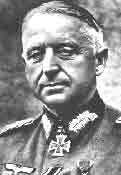Erich von Manstein

(1885 - 1973)
Raised with what he described as the army's "traditional
notions of simplicity and chivalry and its soldierly conception of honor,"
Erich von Manstein hailed from the old Prussian military caste of officers.
(Carver, 222). According to Field Marshal Lord Carver, Manstein had
"above all, great strength of character, standing up to his superiors,
including Hitler, if
he thought they were wrong..." (ibid.).
Manstein loathed the Nazi clique but welcomed Hitler's
campaign to restore Germany's
military power. A great admirer of von
Moltke, he modelled his strategy after him. Like Guderian,
he believed the strength of the German Army lay in its aptitude for
blitzkrieg warfare.
During the campaign against France,
Manstein's corps is the first to breach the Seine river. In Russia,
he serves with Army Group South and masterminds the conquest of the
Crimea and the capture of Sevastopol for which Hitler rewards him with the field marshal's baton. In August 1942, Hitler assigns Manstein to Army Group North in a renewed bid to capture the
city of Leningrad. Manstein's elder son is killed in action. Like many
of his colleagues, he considers Hitler's obsession with peripheral objectives
like the mineral wealth of the Ukraine instead of the capture of Moscow
to be strategic madness.
Increasingly frustrated with Hitler's disastrous conduct
of the war, Manstein repeatedly urges the Fuhrer to delegate responsibility
for over-all strategy to a supreme Wehrmacht commander-in-chief - a
request Hitler repeatedly
denies. As the war in Russia turns catastrophic, Manstein repeatedly
begs Hitler to authorize
a timely retreat that would allow the Wehrmacht to regroup and fight
along a shorter and more tenable front. But his requests from Stalingrad
to Kursk are rejected lock, stock, and barrel. Manstein's tragedy is
that he is trying wage war to secure the best possible outcome for Germany
but must bow to a maddened tyrant who harbors a death wish for Germany.
The conspirators planning to assassinate Hitler are well aware of Manstein's anger with Hitler's conduct of the war.
Given his high influence in the army, they hope to recruit him into
the conspiracy. But like Guderian,
he believes Germany's fate would be better served if he could persuade Hitler to relinquish
the running of the war to the General Staff. Therefore, like Guderian,
Manstein rejects all appeals to the join the conspiracy. After the war,
Manstein gives the following explanation for his refusal to join the
conspiracy:
"As one responsible for an army group in the
field, I did not feel that I had the right to contemplate a coup d'etat
in wartime because in my view it would have led to an immediate collapse
of the front and probably to chaos inside Germany. Apart from this,
there was always the question of the military oath and the admissibility
of murder for political motives. As I said at my trial: "No senior
military commander can for years on end expect his soldiers to lay
down their lives for victory and then precipitate defeat by his own
hand." (Carver, 243).
Neither Stauffenberg,
nor Tresckow, nor Oster,
nor any of the other conspirators could have ever agreed with Manstein's
outlook. On the contrary, they believed a coup d'etat was the only possible
hope to save Germany from annihilation and to spare the lives of the
millions of people Hitler was fated to kill. But tragically, Manstein's attitude reflected that
of the General Staff as a whole.
To his credit, Manstein, like Guderian,
never betrays the conspirators to Hitler's inquisition. Nor does he
succumb to blaming others during his trial at Nuremburg in 1948 when he successfully defends the General Staff and OKW and secures
their acquittal from being labeled as criminal organizations. Nevertheless,
Manstein is later tried by a British military court for war crimes charges
brought against him by the Soviets.
The charges focuse on his passing on and co-signing
an order that read 'the Jewish-Bolshevist
system must be exterminated once and for all and should never be again
be allowed to invade our European Lebensraum.' (Carver, 231). But Manstein
did not allow the order to be passed on without his addendum which stated:
"severe steps will be taken against arbitrary action and self-interest,
against savagery and indiscipline, against any violation of the honor
of the soldier." (ibid.).
Manstein received an 18-year prison sentence. He resented
the fact that, having surrendered to General Montgomery as a prisoner
of war, he should stand trial as a common criminal. But four years into
his sentence, in 1953, he wais released from prison and later called
on by West German Chancellor Konrad Adenauer in 1956 to act as a senior
advisor in the effort to help build the new German army and thereby
enable Germany's entry into NATO.
Sources: Joric
Center |